#reinis tumovs
Text

After a shocking win against #Germany, #Japan fans stayed after the match to clean up the stadium. Truly exemplary where all other fans can learn from them.
Great respect to the Japanese fans! 😍
142 notes
·
View notes
Text
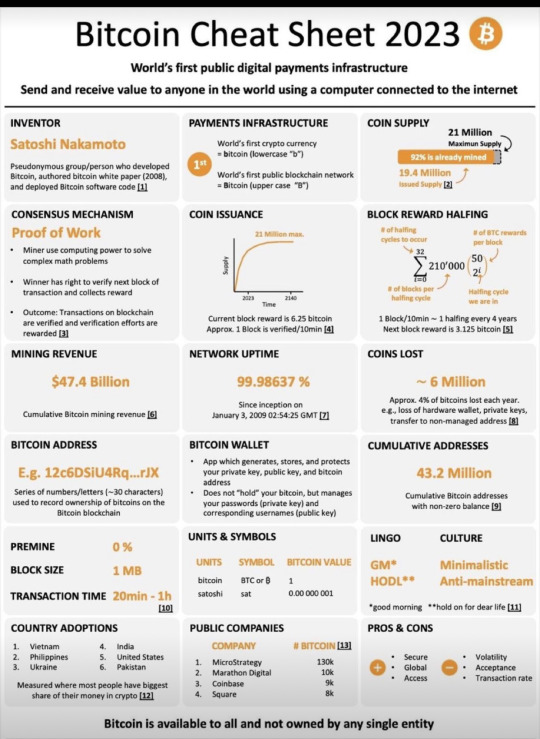
Bitcoin Cheat Sheet 2023
#tumovs#blockchain#тумовс#reinis tumovs#neobankers#crypto#defi#bitcoin#fintech#rtumovs#wkwgroup#crypto market
29 notes
·
View notes
Text

The popular gastronomic guide Taste Atlas has ranked the best national cuisines in 2022. The TOP was formed based on the results of a survey of travelers who voted for food and drinks.
In total, the ranking includes 95 cuisines of the world. Topped the ranking of Italian cuisine
TOP 10 looks like this:
* Italian Cuisine
* Greek cuisine
* Spanish cuisine
* Japanese food
* Indian kitchen
* Mexican cuisine
* Turkish cuisine
* American cuisine
* French cuisine
* Peruvian cuisine
Least of all travelers liked the national cuisines of Latvia (93) - 😩😫😢, Morocco (94th place) and Norway (95th place).
#tumovs#wkwgroup#тумовс#rtumovs#reinis tumovs#cuisine#food#mexican#italia#greek cuisine#italian cuisine#Spanish cuisine#turkish cuisine#japanese cuisine#american cuisine#french cuisine#peruvian cuisine#latvian
43 notes
·
View notes
Text
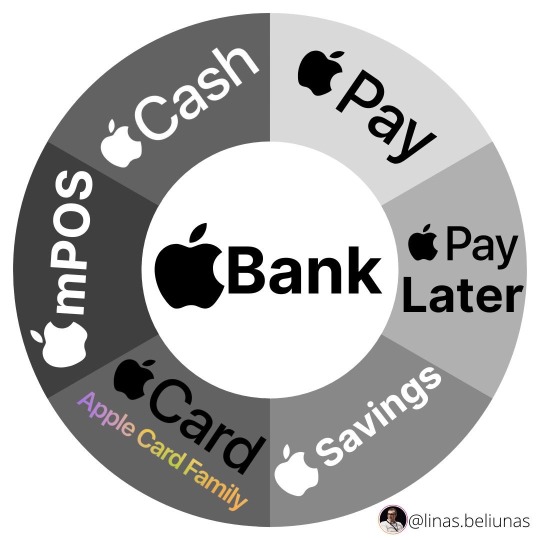
In 2023, Apple can become the biggest bank
in the world 🤯
Without actually being a bank…
When you think about it, a bank effectively has:
1. A giant balance sheet
2. Lots of data and capabilities to process it
3. Distribution
4. A license and/or regulatory oversight
Apple has it all even without the banking charter.
More importantly, recent moves into Buy Now, Pay Later and Savings accounts are yet another building blocks for the Apple Finance empire showing the tech titan is seriously planning on diving deeper into the financial services sphere.
And it makes a ton of sense for Apple to become a bank (directly or not):
- Revenue diversification 📊 52% of Apple’s revenue today comes from a single product - iPhone. By doubling down on the finance sector, Apple would be able to diversify its revenue streams and tap into a stable and growing market. A case in point here could be Shopify which now makes 73% of its revenue from FinTech solutions.
- Strong brand recognition 🔥 Apple has the most valuable and trusted brand in the world. This brand recognition is a major advantage for the tech giant vs. any other FinTech or challenger bank. Plus, every 6th person in the world already has an iPhone in his/her pocket.
- Strong financial position 💸 Apple is a financially strong company with large cash reserves. With $20.7 billion in profit just in the last quarter and more than $23 billion of cash at hand, the tech giant has all the resources it needs to compete pretty much with anyone in the banking world. Also, with massive valuation declines in both public and private markets, it might be a brilliant time for Apple to go on a buying spree and further solidify its market dominance. Potential acquisitions could be Goldman Sachs’ consumer banking division aka Marcus, Revolut, or Dave.If Apple executes this strategy the way it does its software and hardware, it’s going to be massive.
And a game-changer to FinTech as we know it.
#tumovs#wkwgroup#тумовс#crypto#fintech#blockchain#defi#rtumovs#reinis tumovs#neobankers#apple inc#apple news#applepodcasts
34 notes
·
View notes
Text
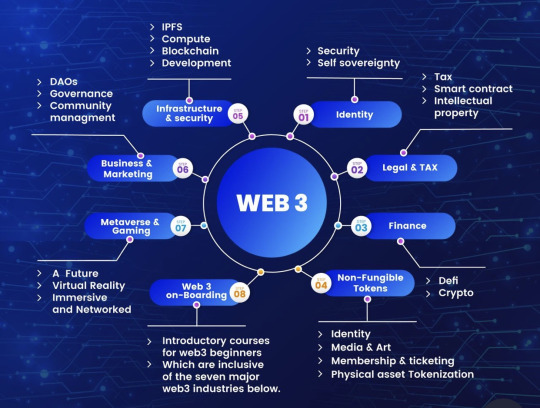
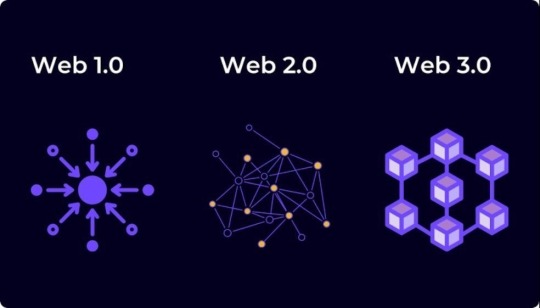
𝐓𝐇𝐄 𝐄𝐕𝐎𝐋𝐔𝐓𝐈𝐎𝐍 𝐎𝐅 𝐖𝐄𝐁𝟑
The Web3 is an evolution of the world wide web and it might interest you to know how technically sound the features of Web3 are.
Web3 is technically carved of many features and this has made it better than web1 and web2 whose feature is not as powerful as web3.
The Web3 is.
. Decentralized
. Trustless and permissionless
. Artificial Intelligence
. Connectivity and ubiquity
The features of Web3 is very interesting and will make alot of things easy for users on the world wide web (www). and one of this is that the Intelligent Search Engine can collate informations and generate tailored recommendations based on profile and preference, saving you hours of work and stress.
This is just a tip of things among the evolution of Web3 you should know.
Stay connected to learn about Web3.
____________________________________
Please leave comments, subscribe and follow my news on my official social media pages: Telegram, LinkedIn, Facebook, Twitter, Gettr, Reddit, and Tumblr.
🤝 Reinis TUMOVS.
#tumovs#wkwgroup#тумовс#banking#bank#crypto#digitalcurrency#fintech#blockchain#defi#reinis tumovs#blockchain technology#bankers#bts#bitcoin#solana#ethereum#web3#crypto market#technology#finance
63 notes
·
View notes
Text
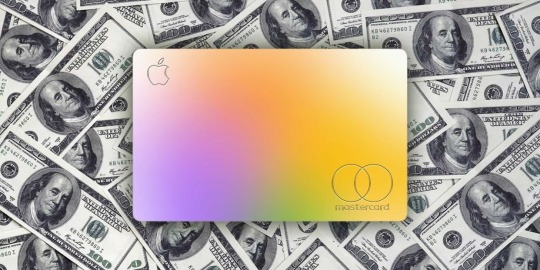
Apple Card responsible for more than $1 billion in losses for Goldman Sachs.
Goldman Sachs submitted a regulatory filing today for its “Platform Solutions” group of businesses that includes Apple Card.
The collection of consumer offerings from Goldman is on track for a loss of $4 billion since 2020 with Apple Card making up more than $1 billion of that.
Reported by Bloomberg, the new performance details from Goldman’s Platform Solutions division paint a grim picture.
In just the first nine months of 2022, the businesses including Apple Card saw a pretax loss of over $1.2 billion.
Looking back to 2020 through the end of September 2022, those losses amounted to $3 billion. But when Q4 results of 2022 are included soon, the number is expected to be close to $4 billion.
The main cause of the losses is said to be from loan-loss provisions (when a bank sets aside money as an expense for future loans it expects won’t be repaid)
____________________________
Please leave comments, subscribe and follow my news on my official social media pages: Telegram, LinkedIn, Facebook, Twitter, Gettr, Reddit, and Tumblr.
🤝 𝐑𝐞𝐢𝐧𝐢𝐬 𝐓𝐔𝐌𝐎𝐕𝐒.
9 notes
·
View notes
Text

Exciting News in Open Banking! 🌐📊
Discover the Ultimate Strategy to Revolutionize the Financial Landscape! 📈🏦
Are you ready to unlock the power of Open Data Ecosystem Strategy? Dive into our latest article that deciphers key decisions in the world of #OpenBanking, #FinTech, and #Banking. 🌐💡
🔗 Read more: [m.facebook.com/story.php?stor…]
🔑 Partnerships 🌟 | 📊 Diversified Models 🌍 | 🕊️ Regulatory Harmony | 💰 Incentive Alignment
🏛️ Standardization & Governance | 🚀 Transition to Open Data | 📈 Regulatory Growth Catalysts
Join the conversation and gain valuable insights! Share your thoughts and be part of the transformation. 🗣️🤝
2 notes
·
View notes
Text
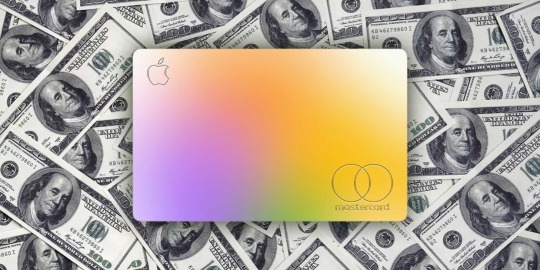
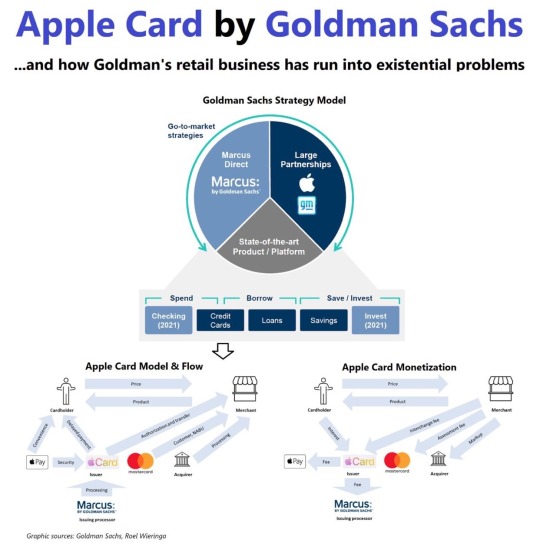
Goldman Sachs’ foray into consumer #banking in 2016 was quickly heralded as (and seemed to be) a great success. A few days ago, the bank announced an almost $3 billion loss from that business. Let’s take a look.
Despite the initial skepticism, Marcus proved a huge success: by 2020, Marcus was one of the fastest-growing #digital #banks in the US with more than $80 billion in deposits and $5 billion in loans.
Aggressive pricing, state-of-the-art #technology, reliable customer service and a well-known brand name count among the reasons for the rise. Markus’ success was twice important because - on top of commercial reasons - it exemplified one thing: how traditional financial institutions (Goldman was founded in 1869) can adapt to the #digital age and compete with #fintech players.
Several things have gone wrong:
1) Goldman’s overly aggressive pricing (to gain market share) during the boom years
2) Poor risk #management with more than 25% of card loans going to financially weak customers and a provision rate at subprime levels
3) Expanding defaults as a result of the deteriorating macro environment
4) Bad management decisions such as the one to merge (previously independent) Marcus with the wealth management segment
5) Service quality (i.e. disputes over chargebacks) not being able to keep up with an increasing customer base.
The credit card business is traditionally a hard one to crack, more so for newcomers even if they are called #Goldman_Sachs. And there seems to be no way back for what was once hailed as one the company’s biggest successes. Timing and bad management decisions have proven – once more – an unbeatable combination.
Reawd more, the full article at: 👉
Opinions: my own, Graphic sources: #Goldman Sachs, Roel Wieringa
____________________________
Please leave comments, subscribe and follow my news on my official social media pages: Telegram, LinkedIn, Facebook, Twitter, Gettr, Reddit, and Tumblr.
🤝 𝐑𝐞𝐢𝐧𝐢𝐬 𝐓𝐔𝐌𝐎𝐕𝐒. @reinis_tumovs
#tumovs #reinis #reinis_tumovs #rtumovs #rtgroup #тумовс #banker #neobanker #тумовс_банкир #tumovs_banker
#tumovs#wkwgroup#тумовс#fintech#defi#rtumovs#reinis tumovs#neobankers#goldman#goldman sachs#apple inc#apple news#apple card#bankers#bank#digital currency#digital#digital banking
7 notes
·
View notes
Text
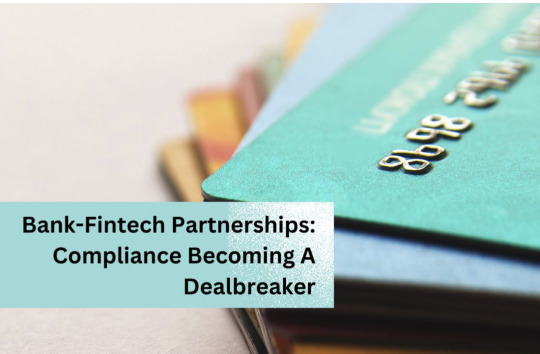
Bank-fintech partnerships have exploded in recent years! Instead of viewing each other solely as competitors, banks and fintechs are choosing to collaborate, working together to build and bring more innovative products to customers. The benefits of these partnerships are clear 🤝
⚡For banks: being able to adopt new technologies faster and cheaper than building them in-house.
⚡For fintechs: banks offer greater resources and the opportunity to reach thousands - perhaps millions - more customers around the world.
And for those customers, bank-fintech partnerships unlock more innovative ways for them to send, spend, and manage their money 💰💳However, these partnerships supported by BaaS providers could be under threat, as examples of companies falling down on compliance have inspired fresh regulatory scrutiny across the #US, UK and #Europe 🚫 Most recently in the #UK, BaaS provider Railsr is being monitored by the Financial Conduct Authority (#FCA) following concerns about the business’ health. Following emergency M&A talks, #Railsr now looks like it will be sold through pre-pack administration. This follows an investigation by Lithuania’s central bank over Railsr’s #AML failures. Regulators may increase oversight of partnerships facilitated by #BaaS providers, but there is a risk that what is in reality isolated incidents could lead to a backlash that makes bank-fintech partnerships appear far riskier than they are, and put banks and fintechs off of them for good ⚠️ Let's not forget that BaaS providers and early-stage fintechs already have limited and often stretched resources. Even for big banks with strong #compliance arms, partnerships may start to look like regulatory quagmires that suck up resources and nullify the biggest benefit of working with a fintech, which is making innovation faster and cheaper 💸💻 The truth is that regulation in its current form should prevent compliance failures and keep customers safe. 📌Regulators can help by providing specific lessons from incidents that allow all banks, fintechs and BaaS providers to revisit their compliance procedures with fresh eyes and make sure they have the tools in place to meet demands. This will give banks and fintechs the confidence to move forward with partnerships, and ensure that the industry and customers around the world continue to benefit from the products and services made possible by cross-industry collaboration in the years to come 🌎🌍🌏 Let's work together to make sure that bank-fintech partnerships continue to drive innovation and provide the best possible services to customers 🙌 _🤝 Dr. 𝐑𝐞𝐢𝐧𝐢𝐬 𝐓𝐔𝐌𝐎𝐕𝐒.
𝘗𝘭𝘦𝘢𝘴𝘦 𝘭𝘦𝘢𝘷𝘦 𝘤𝘰𝘮𝘮𝘦𝘯𝘵𝘴, 𝘴𝘶𝘣𝘴𝘤𝘳𝘪𝘣𝘦 𝘢𝘯𝘥 𝘧𝘰𝘭𝘭𝘰𝘸 𝘮𝘺 𝘯𝘦𝘸𝘴 𝘰𝘯 𝘮𝘺 𝘰𝘧𝘧𝘪𝘤𝘪𝘢𝘭 𝘴𝘰𝘤𝘪𝘢𝘭 𝘮𝘦𝘥𝘪𝘢 𝘱𝘢𝘨𝘦𝘴.
t.me/reinis_tumovs
facebook.com/TUMOVS
linkedin.com/in/tumovs
#tumovs #reinis_tumovs #rtumovs #rtgroup #тумовс #рейнис_тумовс
5 notes
·
View notes
Text
2 notes
·
View notes
Text
#tumovs#тумовс#rtumovs#reinis tumovs#usa#wall streeet journal#wall street#main street#wkwgroup#neobankers
2 notes
·
View notes
Text

Market Mood...
1 note
·
View note
Text
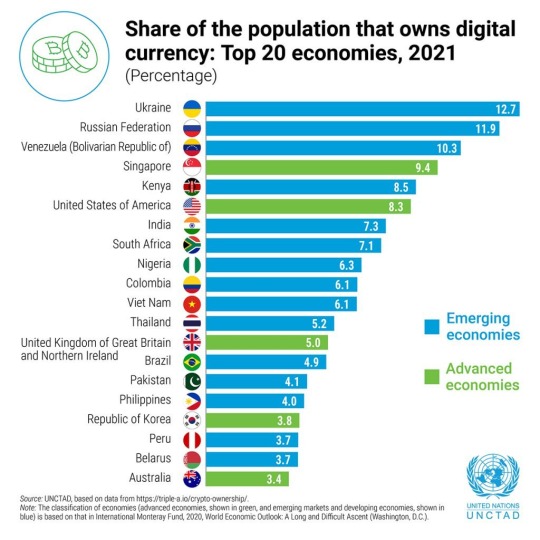
No comments 🤷♂️
2 notes
·
View notes
Text
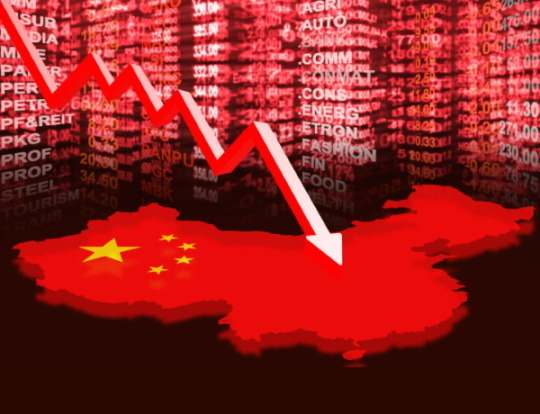
🔥 Unveiling China's Economic Challenges: Dive into the Upheaval of the World's Second-Largest Economy! Don't Miss Out! 🌐
Beneath the bustling surface of the world's second-largest economy, China, lies a landscape of turbulence that has caught global attention. Let's delve into the riveting developments that have sent shockwaves through international markets:
• Amidst efforts to revive economic vigor, the People's Bank of China enacted a dramatic emergency rate cut on its MLF, descending to its lowest level since 2020. A bold move, but equities responded with a surprise sell-off.
• China's 10-year government bond yield echoes the hushed reverberations of the pandemic era, now resting at the lowest point since the 2020 outbreak.
• A stern government advisory to investment funds, warning them against adopting the role of net sellers in the Chinese stock market, reflects a desperate attempt to curb potential aftershocks.
• The dreaded specter of deflation looms; consumer prices, a cornerstone of economic vitality, experienced a staggering -0.3% year-on-year plunge. An alarming hint at possible global repercussions.
• The towering quandary of China's real estate domain remains unresolved, magnifying its significance as arguably the world's largest asset class.
• A harbinger of peril, China's second-largest real estate giant, Country Garden, teeters at the precipice of a potential onshore bond default. An eerie resonance with the Evergrande fiasco
• Chinese shadow bank, Zhongrong International Trust Co which manages $140 billion has missed payments on products because of liquidity problems, they are part of a $2.9 trillion shadow banking system.
• Pervasive skepticism takes root as a slew of investment banks downgrade their economic growth forecasts for China, casting a shadow over its economic trajectory.
• A stark and chilling portrait of China's economic health, as new loans for July skid to a gloomy low, reminiscent of the bleak days of 2009.
�� The echoes of contraction resound through both exports and imports, painting a grim outlook for China's international trade landscape.
• The housing market crumbles, with July witnessing a remorseless tumble in home prices, amplifying concerns about the real estate quandary.
• A strategic shift unfolds as China's U.S. Treasury holdings plunge to their lowest ebb since 2009, replaced by the glint of gold and a newfound embrace of agricultural staples such as rice, wheat, maize, and soybeans.
• In an enigmatic twist, China's government retreats from revealing youth unemployment statistics, a decision that raises eyebrows and triggers whispers of concern.
As the giant grapples with internal fissures, its impact resonates far beyond its borders, leaving the world to watch with bated breath, pondering the ripple effects of China's convulsions on the global stage.
#ChinaEconomy #tumovs #rtumovs #reinistumovs #wkwgroup #wkw_group #GlobalMarketTurbulence #EconomicInsights #ChinaTroubles #EconomicShifts
Join the conversation and gain valuable insights! Share your thoughts and be part of the transformation. 🗣️🤝"
1 note
·
View note
Text
"Unlocking the Invisible: Pioneering the Future of Banking and FinTech"
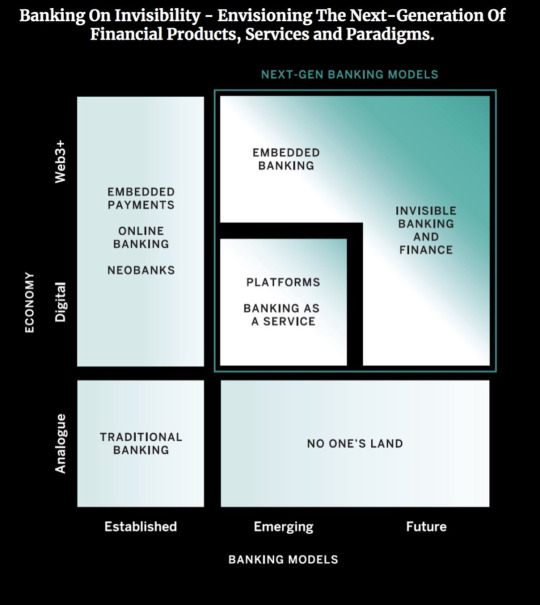
Banking On Invisibility - Envisioning The Next-Generation Of Financial Products, Services and Paradigms
In the not-so-distant past, banks adorned prime locations along bustling streets. Today, their prominence is wavering, and a future looms where they might vanish even from our phone screens. Financial services are seamlessly intertwining with technology and various industries, almost fading into invisibility.
While the demise of traditional banking has been a recurring topic among pundits, the ascent of digital finance has unquestionably chipped away at the once-familiar brick-and-mortar bank. Yet, could digital finance merely serve as a transient bridge to a truly revolutionary era?
Open Banking has empowered diverse brands to embody financial institutions, seamlessly integrating loans, payments, payroll, and more into their existing offerings. The ongoing surge of consumer tech innovation merges the physical and digital realms in our daily lives, enabling us to transact effortlessly without fixating on the financial dimension. Departing a store, our purchases are automatically tallied and deducted; our smart devices autonomously place orders and process payments. Our bank accounts evolve into intelligent, automated allies, optimizing our savings journey.
Financial services, a traditionally conservative industry, are subject to rigorous regulation. While change may be gradual, its impact ripples across sectors, given money's fundamental role. This metamorphosis heralds fresh revenue avenues beyond finance's confines, catalyzing transformative repercussions.
Alternative operational models and revenue streams are sprouting across the financial landscape. Next-gen banking paradigms foretell an array of innovative products and services tailored for a world where industry boundaries blur or fade away.
The automotive industry's evolution from "car" to "mobility" exemplifies this shift, extending value chains beyond physical products and fostering broader interpretation. As financial and non-financial sectors intermingle, banking gains the ability to subtly infiltrate the subconscious, steering evolving customer expectations and novel competitive dynamics.
To thrive in this invisible landscape, banks must fathom customer needs, habits, and aspirations. Financial professionals must conjure the dual magic of becoming both unseen and all-seeing. An entirely novel form of finance beckons on the horizon—one abstract, seamless, and intrinsically interconnected.
#InvisibleFinance #FutureBanking #TechInnovation #FinancialEvolution #CustomerCentric #SeamlessTransactions #InnovationFrontiers #Innovation #Fintech #Banking #OpenBanking #OpenFinance #EmbeddedFinance #OpenAPIs #BaaS #BaaP #FinancialServices #CoreBanking #Payments #SaaS
1 note
·
View note
Text
1 note
·
View note